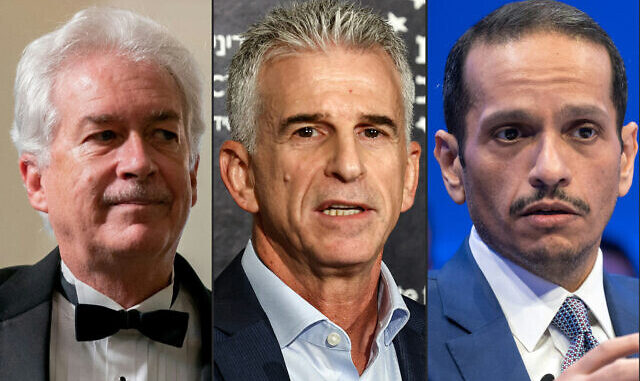T. Belman. This is a big test for Netanyahu. Will he stick to his words or cave to American pressure? Will he dance with the ones who brought him to government, or reject them in favour of his emergency coalition.
Ben Gvir says he trusts Netanyahu to halt negotiations after medicines not delivered to hostages; Smotrich suggests Mossad’s time better spent in Gaza
By SAM SOKOL
National Security Minister Itamar Ben Gvir and Prime Minister Benjamin Netanyahu meet with the troops who participated in the hostage rescue operation in Gaza on February 12, 2024. (Kobi Gideon/GPO)
In a letter to Netanyahu on Tuesday, National Security Minister Itamar Ben Gvir demanded an end to humanitarian aid to the Gaza Strip, after the niece of rescued hostage Fernando Marman revealed that he never received any medication while in captivity, despite a Qatar-brokered deal that was supposed to see this happen.
Even as Israeli officials, under American pressure, take part in ceasefire talks in Cairo, Prime Minister Benjamin Netanyahu remains under intense domestic pressure from his hard-right coalition allies to reject what they see as an “irresponsible deal” to halt the IDF’s ongoing offensive in the Gaza Strip.
Objecting to Hebrew media reports that the prime minister tasked IDF hostage envoy Nitzan Alon, Mossad spy agency chief David Barnea and Shin Bet security agency chief Ronen Bar to represent Israel in the Egyptian capital, Finance Minister Bezalel Smotrich said on Monday that senior intelligence officials would be better utilized in the field in Gaza.
Meeting with members of the police’s elite Yamam counterterrorism unit who had rescued two Israeli hostages in Rafah the previous evening, Otzma Yehudit party head Ben Gvir on Monday expressed a similar sentiment — declaring that he trusted in Netanyahu to reject an “irresponsible deal, and that with God’s help, we will fight to the end.”
According to Egyptian media reports, CIA director William Burns, Mossad chief David Barnea and Qatari Prime Minister Mohammed bin Abdulrahman Al-Thani are meeting Tuesday with Egyptian officials in Cairo “to discuss a truce in Gaza.”
Al-Qahera News, which has links to Egyptian intelligence, reports the “quartet” meeting as international pressure grows for a truce between Israel and Hamas.
According to the official, the meeting will focus on “crafting a final draft” of a six-week ceasefire deal, with guarantees that the parties will continue negotiations toward a permanent ceasefire.
Hamas has proposed a ceasefire plan that would see a four-and-a-half-month truce during which hostages would be freed in three stages, and which would lead to an Israel withdrawal.
The Palestinian terror group’s demands include a permanent ceasefire, a withdrawal of troops from Gaza, reconstruction of the enclave, and the release some 1,500 Palestinian prisoners, among them terror masterminds, in exchange for the remaining hostages taken on October 7.
Netanyahu has rejected Hamas’s “delusional” conditions, arguing that only military pressure will secure the release of the Israelis being held captive in the Gaza Strip.
Israel has waffled on sending representatives to the Cairo talks but top officials from the United States have said that, regardless of some of the “nonstarters,” there is space to push for an agreement and that Washington intended to do so.
Biden said on Monday that the US was pushing for a six-week pause in the fighting between Israel and Hamas as a stepping stonetoward a longer ceasefire.
Biden, who has shown increasing frustration with Netanyahu for not heeding his advice, said Washington was working with allies in the region on a deal “to find the means to bring all the hostages home, to ease the humanitarian crisis, to end the terror threat and to bring peace to Gaza and Israel through a two-state solution.”
While the coalition’s right flank is pushing Netanyahu to reject American pressure, Opposition Leader Yair Lapid — who has previously offered to enter the government to replace Ben Gvir to ensure there was coalition backing for a deal — argued the opposite on Monday, declaring that the hostages’ return must precede a military victory.
“The Americans, the French, the Qataris and the Egyptians think that there is now a window of opportunity for a hostage deal, which is not long,” Lapid said during his Yesh Atid party’s weekly faction meeting, citing recent conversations with US Secretary of State Antony Blinken and French President Emmanuel Macron.
“No one can define exactly what ‘not long’ is, whether it is two or three weeks, but this is the time frame in which they still think a deal can be made,” he stated, adding that the Israeli government “cannot ignore any chance, even the smallest, of making a hostage deal.”
According to reports over the weekend, Israel is willing to accept talks based on the original Paris framework, an outline for a humanitarian pause in the fighting drafted last month by top officials from the US, Israel, Qatar, and Egypt.
Despite a slim majority of Israelis believing that rescuing the hostages must take precedence over military victory, 60% of Jewish citizens polled last month believe that such a deal must not come at the price of “releasing all Palestinian prisoners and halting the fighting in Gaza.”
“These people were abandoned by the government and the security system, and the government and the security system have a moral obligation to bring them home,” Lapid alleged, adding that an operation in the southern Gaza city of Rafah, the last remaining major Hamas stronghold in the Strip, “should be part of an organized strategic plan for the day after” the war.
“There is more political work to be done with the Americans and especially with the Egyptians,” said Lapid. “This will be a completely different type of operation than what we saw in the north of the Gaza Strip or in the central camps. The State of Israel needs time to prepare it. The hostages should be brought home now.”
Lapid’s comments came a day after Defense Minister Yoav Gallant said Sunday that the military’s intelligence findings on Hamas bring a “realistic” hostage deal closer.
The war erupted when Hamas-led terrorists stormed southern Israel on October 7 to kill nearly 1,200 people, mainly civilians, while taking 253 hostages of all ages, committing numerous atrocities, and weaponizing sexual violence on a mass scale.
It is believed that 130 hostages abducted by Hamas on October 7 remain in Gaza — not all of them alive. A weeklong truce in late November saw 105 civilians released by the terror group.
Times of Israel staff and agencies contributed to this report.





Leave a Reply
You must be logged in to post a comment.